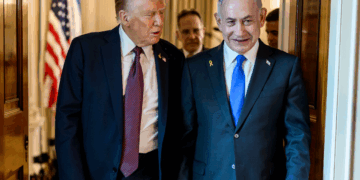January 23, 2025
Can Donald Trump expand the Abraham Accords? Ask Benjamin Netanyahu

President Donald Trump has ambitious plans for his foreign policy. Whether it’s settling Europe’s deadliest war in nearly 80 years, ending the 15 month-long conflict in Gaza, or reorienting how the United States does business in Europe, the 45th and now 47th president will use the next four years to usher in a transformation that, if all goes well, will result in a stronger, more resilient America.
Expanding the 2020 Abraham Accords, the most noteworthy diplomatic accomplishment during Trump’s first term, is also at the top of his list. The series of agreements, which even former Biden administration officials gave Trump credit for, normalized relations between Israel and several Arab-majority states through investment opportunities, the re-opening of embassies, and cooperation in the fields of science, education, and the environment. After Trump strong-armed Israeli Prime Minister Benjamin Netanyahu and Hamas into a temporary ceasefire last week, Trump stated that he would “build upon the momentum” to make the Abraham Accords a bigger and better product. What Trump really means is striking a normalization agreement between Israel and Saudi Arabia, which National Security Adviser Mike Waltz says is a “huge priority” for the administration.
Is Israeli-Saudi normalization within the realm of possibility? Yes, anything is possible. But while one wants to be optimistic during the start of a new U.S. administration, the fact is that this diplomatic coup is unlikely unless two things change—the war in Gaza ends permanently and Prime Minister Netanyahu suddenly concludes that establishing an independent Palestinian state is in Israel’s own interests.
More on Middle East

Featuring Daniel DePetris
October 8, 2025
Events on Israel-Hamas








